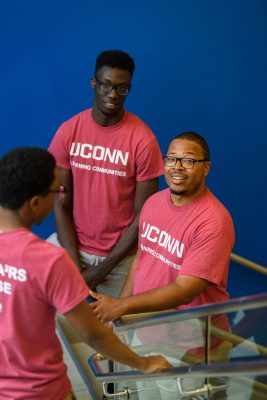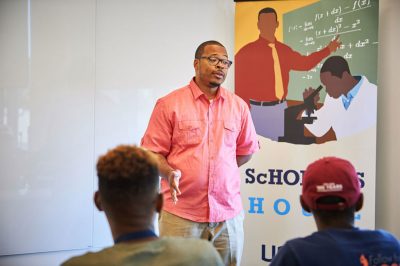
Editor’s Note: The following piece, authored by Julie (Stagis) Bartucca ’10 (BUS, CLAS), was originally published in UConn Magazine’s Fall 2017 Edition. View the original story on the UConn Magazine website.
Erik Hines is passionate about helping black male students succeed at UConn. The assistant professor in the Neag School of Education says he is on a mission to help attract and retain African-American male students.
As faculty director of the new learning community ScHOLA²RS House, Hines hopes to gain a deeper understanding of the variables that influence positive academic and career outcomes for black males, the subject at the heart of both his day-to-day counseling work and his academic research. (ScHOLA²RS stands for Scholastic House of Leaders in Support of African-American Researchers & Scholars).
“We want to cultivate all of our students to be the best and brightest.”
“He is all in,” says Sally Reis, the former associate provost who brought Hines in to work on the newest of the University’s learning communities. “He is completely dedicated to these young men, focused on their graduation from UConn and their success in graduate school and work. He is passionate, committed, and a remarkably strong mentor.”
Born and raised in Tampa, Hines decided to become a school counselor while attending community college there. He went on to earn his bachelor’s in social science education at Florida State University, his master’s in education for school counseling at the College of William & Mary, and his Ph.D. in counselor education at the University of Maryland. He joined the UConn faculty in August 2014.
Hines says he is doing the work he set out to do at age 19. “My career feels purposeful, fulfilling, and empowering. All I think about now is solutions for improving the graduation rate for black males, recruitment of black males in STEM and career fields in which they are underrepresented, and how we help first-generation and other vulnerable populations be successful, too.”
We caught up with Hines over the summer in his Gentry Building office, which overlooks a grassy, tree-lined knoll next to The Benton.
Q: You work with graduate students, preparing them to become school counselors. How has educating them changed with new challenges, such as social media, cyber bullying, and climbing rates of suicide in adolescents?
Hines: Counselors’ goals still are variations of making sure students get their needs met socially and emotionally, even outside the school walls, and accountability — ensuring that students not only understand what they need to know to get to the next grade, but also think long-term: What will life be like post–high school?
I would say school counselors are needed now more than ever. When we were in the space race, after Sputnik, the federal mandate came to put in school counselors to identify the best and brightest in science and math [Title V of the National Defense of Education Act, 1958]. Now, we want to cultivate all of our students to be the best and brightest.
Q: Neag’s school counselor program emphasizes working with underrepresented students. What are some of the tools that you teach to specifically work with those populations?
Hines: We train students to look at the data, as well as how to collect data of their own through observations in classrooms, surveys, reading articles. We teach them to find literature that supports what they want to do and to address what the data is telling them.
Hines: In my School Counseling Development and Evaluation course, students do a mock advocacy project. They use the U.S. Department of Education’s Civil Rights Data Collection website to look at a local school district. They look for gaps, disaggregating the data by factors such as race, socioeconomic status, and gender.
Say an AP algebra II class has 20 students, and 5 are female. There’s obviously a gender imbalance. So students try to figure out why: they can interview teachers and students and look at the process by which students are chosen to take the class. We discuss best strategies for how to advocate for all students to be eligible for these types of programs and courses, maybe advertising the course to girls, or encouraging the school counselors to talk to students about it. Maybe the teacher needs more culturally responsive training to understand how to promote equity in the classroom.
Imagine an educational pipeline from pre-K all the way to graduate school. We are trying to make sure that we close all the leaks in the pipeline. The leaks can be under-resourced schools, teachers not adequately helping students get their needs met academically, and so on. We want to partner with teachers to help them best work with students, and vice-versa.
Q: What sort of pipeline got you to where you are?
Hines: I am forever grateful for the education I received in the great state of Florida. I went to mostly public schools. I went to a community college. And I think being in community college helped me really reflect on my life, because I didn’t do so well my first semester, but it encouraged me to think about what I really wanted to do that could be impactful as a job or career. Of course, my mother was on top of me saying, “You can’t be in college forever.”
Hines: Yes, I did. Yes! Even at times from my bachelor’s to master’s, she told me I needed to get a job. Don’t think she didn’t say that. “You’re going back to school again? You need a job!”
I thought about my strengths, I thought about what I could do, I thought about what I would be fulfilled by doing. I was helping in my local church at the time as a Sunday School teacher. And I was like, oh, I like kids. And then I really thought about my life and what I felt I didn’t get or I needed more of [growing up]. I think in high school, if I really had more people to push me, or I knew about more of the programs available to me, I could have been more successful.
My junior high school counselor, Mr. Robert Davis, stands out though. He was always trying to provide opportunities. He was very engaged with students. He took students on field trips to New York, for instance. Remembering that helped me think, “I want to be a school counselor.”
Q: Was it a straight path?
Hines: I started by going through computer science and business as majors, thinking I wanted to make a lot of money. Then I realized what I really wanted to do was help students develop their potential.
Hines: At Florida State University I met two of my mentors, Dr. Lee Jones, who has since passed away, and Dr. James L. Moore III. [Moore is now interim vice provost for diversity and inclusion and chief diversity officer at The Ohio State University.]
Because of them, I was in the Brothers of the Academy, an academic organization for black men who aim to be tenure-track faculty or academic administrators. That helped me think about how we best help African-American students, and students in general who need help.
Q: How did the idea for ScHOLA²RS House develop?
Hines: Administrators looked at the data — when we talk about advocating, again, we have to look at what the data is saying. And the data told them that the graduation rate for black males at UConn was 55 percent, where our other populations — men, women, Asian, Latinx, white, black women — they were hovering in the high 70s and low 80s. And UConn’s overall graduation rate at the time, 2012–2013, was at 83 percent. They decided that a black male learning community could be instrumental in helping black men.
Currently, at any given time, there’s between 450 and 500 black males on campus, from freshmen to seniors, and there’s 18,000 to 19,000 students on the Storrs campus. So you can imagine, the population is that small, and only half of them were graduating. Something needed to be done.
How do we as a community, how do I as a professor, a father, a teacher, a mentor, an African-American male, help other young men be successful, transcend some of these issues, and not get too bogged down?
Hines: Yeah! I was focused on the academic achievement part. So I was like, “Oh, this is great!” Because it was crazy that the graduation rate was 55 percent. Nationally for black males, it’s 34 percent, so we’re actually doing better because our institution is more selective, and a lot of our black men are coming from the top of their high school classes. Still, imagine that you graduate salutatorian or valedictorian from your high school, and then you look at that rate and think, “UConn may not be a viable option for me to complete.” That’s problematic.
I was naive to the fact people would be concerned about black men living together.
Hines: Some students were hesitant; some wanted to see what it was about. Of course there was some racist propaganda, some students who were African-American who thought it was segregation. I had to combat the stereotype. What is problematic with black men living together? We have other groups living together on campus [WiMSE, or Women in Math, Science, and Engineering, is an all-female learning community, for example.]
To me, [if that’s seen as a problem], then we need to challenge our paradigm of what we think about black men. This should be something that — and I applaud the University of Connecticut — we have to jump on, be at the forefront. We have to take on some of these challenging issues that may not make everyone happy.
Q: Our University spokesperson said she was so shocked by some of the nastiness that you heard from people on the internet. But she said you weren’t shocked by it.
Hines: I’m not. I live and breathe being an African-American man every day. Sometimes I do get those looks; I have been searched unlawfully; I have been questioned about my intellect. I stick with data and I look at the bigger picture: How do we as a community, how do I as a professor, a father, a teacher, a mentor, an African-American male, help other young men be successful, transcend some of these issues, and not get too bogged down? I’m not saying ignore it, because I’m not doing that, but sometimes you have to be the bigger person to challenge it.
I believe the University of Connecticut is on the verge of doing something very innovative and I believe we can be pioneers in improving the graduation rate of black men, and showing our fellow institutions how to do that as well.

 Facebook
Facebook
 Twitter
Twitter
 LinkedIn
LinkedIn
